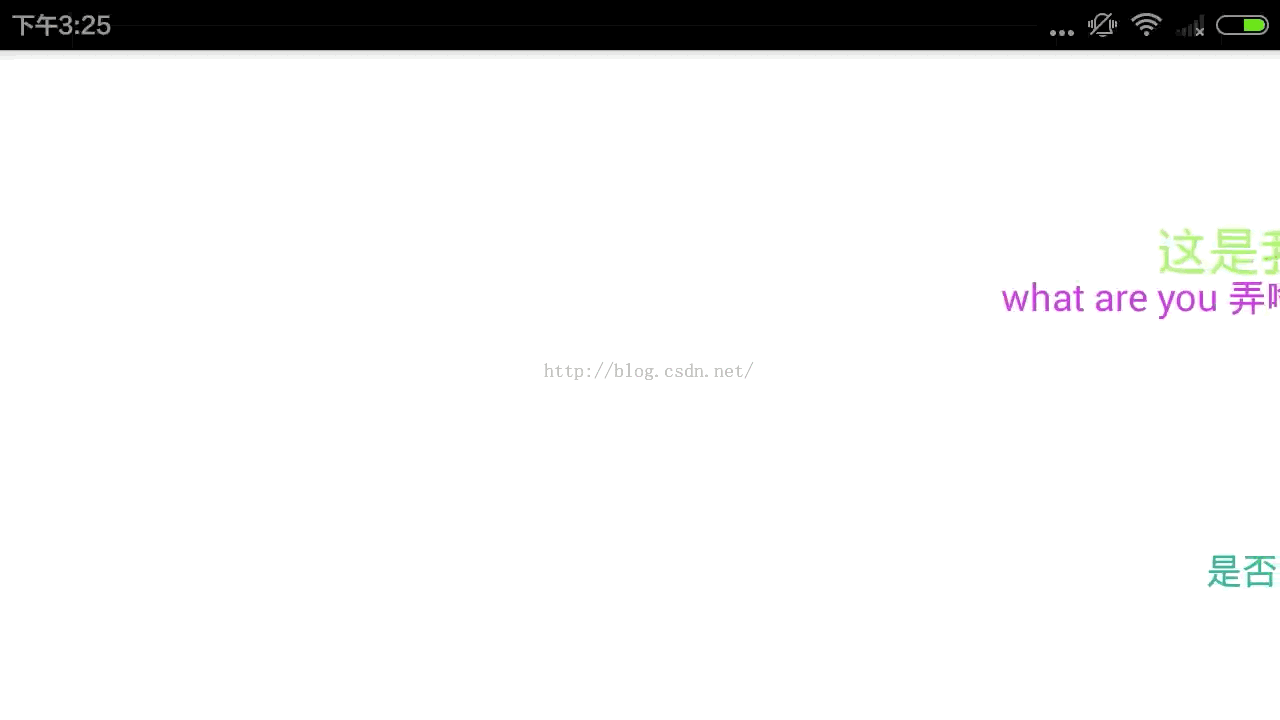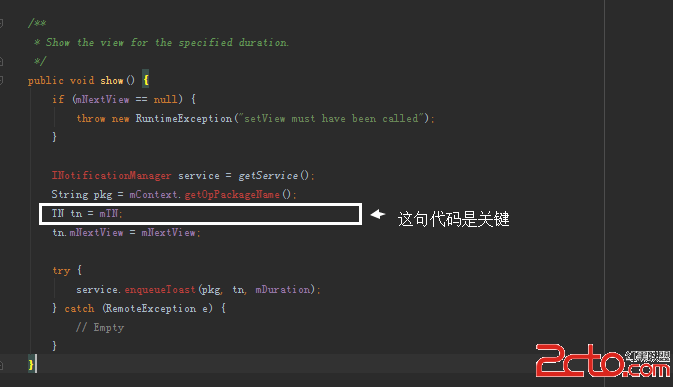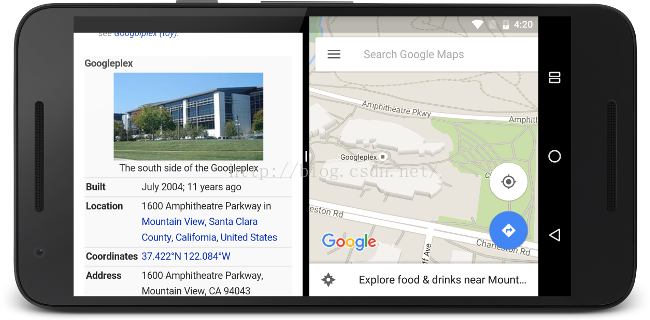編輯:關於Android編程
在B站或者其他視頻網站看視頻時,常常會打開彈幕效果,邊看節目邊看大家的吐槽。彈幕看起來很有意思,今天我們就來實現一個簡單的彈幕效果。

從直觀上,彈幕效果就是在一個ViewGroup上增加一些View,然後讓這些View移動起來。所以,整體的實現思路大概是這樣的:
1、定義一個RelativeLayout,在裡面動態添加TextView。
2、這些TextView的字體大小、顏色、移動速度、初始位置都是隨機的。
3、將TextView添加到RelativeLayout的右邊緣,每隔一段時間添加一個。
4、對每個TextView做平移動畫,使得TextView從右向左移動。
5、當TextView從左邊移動出屏幕,將TextView從RelativeLayout中移除。
有了思路下面就來看具體的代碼。
首先定義BarrageItem,用來存儲每一個彈幕項的相關信息,包括字體內容、字體大小顏色、移動速度、垂直方向的位置、字體占據的寬度等。
public class BarrageItem {
public TextView textView;
public int textColor;
public String text;
public int textSize;
public int moveSpeed;//移動速度
public int verticalPos;//垂直方向顯示的位置
public int textMeasuredWidth;//字體顯示占據的寬度
}
然後定義BarrageView,由於彈幕的字體顏色大小和移動速度都是隨機的,需要定義最大最小值來限定它們的范圍,然後通過產生隨機數來設置它們在這個范圍內的值。另外還需要定義彈幕的文本內容,這裡是直接寫死的一些固定值。
private Context mContext;
private BarrageHandler mHandler = new BarrageHandler();
private Random random = new Random(System.currentTimeMillis());
private static final long BARRAGE_GAP_MIN_DURATION = 1000;//兩個彈幕的最小間隔時間
private static final long BARRAGE_GAP_MAX_DURATION = 2000;//兩個彈幕的最大間隔時間
private int maxSpeed = 10000;//速度,ms
private int minSpeed = 5000;//速度,ms
private int maxSize = 30;//文字大小,dp
private int minSize = 15;//文字大小,dp
private int totalHeight = 0;
private int lineHeight = 0;//每一行彈幕的高度
private int totalLine = 0;//彈幕的行數
private String[] itemText = {"是否需要幫忙", "what are you 弄啥來", "哈哈哈哈哈哈哈", "搶占沙發。。。。。。", "************", "是否需要幫忙","我不會輕易的狗帶", "嘿嘿", "這是我見過的最長長長長長長長長長長長的評論"};
private int textCount;
// private List<BarrageItem> itemList = new ArrayList<BarrageItem>();
public BarrageView(Context context) {
this(context, null);
}
public BarrageView(Context context, AttributeSet attrs) {
this(context, attrs, 0);
}
public BarrageView(Context context, AttributeSet attrs, int defStyleAttr) {
super(context, attrs, defStyleAttr);
mContext = context;
init();
}
如果彈幕顯示的垂直位置是隨機的,就會出現垂直方向上彈幕重疊的情況,所以需要根據高度對垂直方向按照彈幕高度的最大值等分,然後讓彈幕在這些指定的垂直位置隨機分布。這個值在onWindowFocusChanged裡計算,因為在這個方法中通過View的getMeasuredHeight()得到的高度不為空。
@Override
public void onWindowFocusChanged(boolean hasWindowFocus) {
super.onWindowFocusChanged(hasWindowFocus);
totalHeight = getMeasuredHeight();
lineHeight = getLineHeight();
totalLine = totalHeight / lineHeight;
}
通過Handler的sendEmptyMessageDelayed每隔隨機的時間產生一個彈幕項。下面的代碼設置彈幕項的屬性。
class BarrageHandler extends Handler {
@Override
public void handleMessage(Message msg) {
super.handleMessage(msg);
generateItem();
//每個彈幕產生的間隔時間隨機
int duration = (int) ((BARRAGE_GAP_MAX_DURATION - BARRAGE_GAP_MIN_DURATION) * Math.random());
this.sendEmptyMessageDelayed(0, duration);
}
}
private void generateItem() {
BarrageItem item = new BarrageItem();
String tx = itemText[(int) (Math.random() * textCount)];
int sz = (int) (minSize + (maxSize - minSize) * Math.random());
item.textView = new TextView(mContext);
item.textView.setText(tx);
item.textView.setTextSize(sz);
item.textView.setTextColor(Color.rgb(random.nextInt(256), random.nextInt(256), random.nextInt(256)));
item.textMeasuredWidth = (int) getTextWidth(item, tx, sz);
item.moveSpeed = (int) (minSpeed + (maxSpeed - minSpeed) * Math.random());
if (totalLine == 0) {
totalHeight = getMeasuredHeight();
lineHeight = getLineHeight();
totalLine = totalHeight / lineHeight;
}
item.verticalPos = random.nextInt(totalLine) * lineHeight;
showBarrageItem(item);
}
將每一個彈幕項添加到視圖上,並給View添加一個TranslateAnimation動畫,當動畫結束時,將View從視圖上移除。
private void showBarrageItem(final BarrageItem item) {
int leftMargin = this.getRight() - this.getLeft() - this.getPaddingLeft();
LayoutParams params = new LayoutParams(LayoutParams.WRAP_CONTENT, LayoutParams.WRAP_CONTENT);
params.addRule(RelativeLayout.ALIGN_PARENT_TOP);
params.topMargin = item.verticalPos;
this.addView(item.textView, params);
Animation anim = generateTranslateAnim(item, leftMargin);
anim.setAnimationListener(new Animation.AnimationListener() {
@Override
public void onAnimationStart(Animation animation) {
}
@Override
public void onAnimationEnd(Animation animation) {
item.textView.clearAnimation();
BarrageView.this.removeView(item.textView);
}
@Override
public void onAnimationRepeat(Animation animation) {
}
});
item.textView.startAnimation(anim);
}
private TranslateAnimation generateTranslateAnim(BarrageItem item, int leftMargin) {
TranslateAnimation anim = new TranslateAnimation(leftMargin, -item.textMeasuredWidth, 0, 0);
anim.setDuration(item.moveSpeed);
anim.setInterpolator(new AccelerateDecelerateInterpolator());
anim.setFillAfter(true);
return anim;
}
這樣就完成了彈幕的功能,實現原理並不復雜。可以根據具體的需求來增加更多的控制,如控制每一行彈幕不重復,控制彈幕移動的Interpolator產生不同的滑動效果等等。
 Android圖片緩存處理
Android圖片緩存處理
LruCache以鍵-值對的形式存儲(內部定義了一個LinkedHashMap)數據,通過new LruCache(int size)實例化,參數使指定分配給LruCac
 Android系統開發(2)——GDB調試工具
Android系統開發(2)——GDB調試工具
調試的過程我們在eclipse中來看一下一般調試的過程:1、debug模式編譯2、打上斷點3、運行調試4、單步調試step into:跳到函數體內部step over:不
 Android藍牙開發,報BluetoothAdapter﹕ Can't create handler inside thread that has not called Looper.prepare
Android藍牙開發,報BluetoothAdapter﹕ Can't create handler inside thread that has not called Looper.prepare
這個錯誤翻譯的意思是:不能在沒有Looper.prepare的線程裡面創建handler。起初我很疑惑,我根本沒有用到工作線程,也沒有創建handler。報錯的代碼如下:
 Android7(N)開發者應該知道的一切(最全)
Android7(N)開發者應該知道的一切(最全)
1.多窗口支持Android N 添加了對同時顯示多個應用窗口的支持。 在手持設備上,兩個應用可以在“分屏”模式中左右並排或上下並排顯示。在電視設